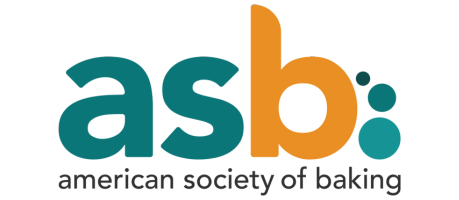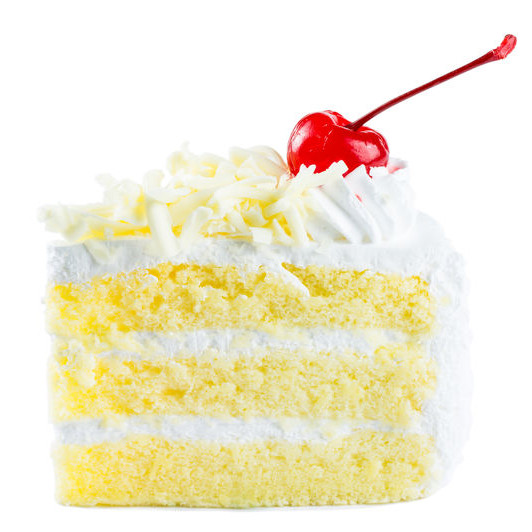Though often pushed aside to cakes such as red velvet, coconut, and death by chocolate, yellow cake perfectly combines the flavors of caramelized sugar, warm butter and vanilla. Yellow cake lends itself well to multiple frosting and filling combinations. Flavoring can be a simple chocolate frosting or raspberry filled layers with a whipped lemon cream.
Flour and chlorination
Soft red winter wheat is a good choice when making cakes due to its low protein content (7% to 9%). The flour can be treated with chlorine gas to a pH of 4.4 to 4.9 to modify the starch.5 Modified starch allows rapid absorption of water and increased swelling of starch granules.4 The swollen starch granules provide viscosity and structure to the cake batter. High ratio cakes made with chlorinated flour are less likely to collapse. Cakes made with untreated flour have less structural stability as the gel structure formed around air cells cannot withstand pressures incurred during the baking process.4
Commercial production
Yellow cake has been commercially produced as a box mix by companies like Duncan Hines and Betty Crocker. The cake mix has been developed to allow home bakers to skip the laborious process of creaming the butter and sugar. The creaming process is key to obtaining an even texture.
Yellow cake is also commercially produced by bakeries for sale a grocery stores as individually frosted cakes or cupcakes.
Yellow layer cake recipe
Single stage method (Adapted from E.J Pyler5)
Dry blend with paddle to simulate cake mix ‘finisher’. Dry blending causes fat globules to become absorbed onto the flour particle surfaces, partially removing them from exerting their de-stabilizing effect on aerated aqueous foam.
| Ingredients | Bakers % | Grams |
|---|---|---|
| Flour | 100% | 500g |
| Sugar | 150% | 600g |
| NFDM (Non fat dry milk) | 6% | 30g |
| Salt | 1.2% | 6g |
| Baking soda | 2.4% | 12g |
| SALP | 2.2% | 10g |
| Vanilla | 1.0% | 5g |
| Dry eggs (45g Yolk/ 30g White) | 15% | 75g |
| Cake shortening, emulsion | 50% | 250g |
| Water | 125% | 625g |
Method:
- Mix shortening and sugar on 1st for 1 minute, scrape down
- Mix on 1st for 4 minute, scrape, remove paddle
- Switch to wire whip
- Add Water (distilled) 125 Bakers %, 625g
- Add 1/3 water, mix on 2ndfor 30 seconds, scrape down
- Add 1/3 water, 2nd for 30 second, scrape down
- Add remaining water, mix on 1st for 15 second
- Mix on 2nd for 15 second, scrape
- Mix on 3rdfor 1 minute to break up/ aerate
- Mix on 2nd for 4 minutes to aerate
- Scale: 400g batter per 8” pan
- Bake: 350°F = 30 minutes with half pressure steam.
- Layer is ‘done’ when it springs back after being gently prodded with finger.
- Shock Layers (drop 3” using peel) as exit oven.
- Cool: 7 minutes
- Invert onto hand, then re-invert onto papered pan.
- Place on racks to cool.
Shelf life
Yellow cake will store in a refrigerator for up to 7 days or 4 to 6 months in the freezer if it is unfrosted and securely wrapped.3 A cold cake can handle the application of frosting and filling better than a room temperature cake.
References
- Olver, Lynne. “The Food Timeline: Cake History Notes.” The Food Timeline: Cake History Notes. N.p., 23 Jan. 2015. http://www.foodtimeline.org/foodcakes.html.
- Park, Michael Y. “A History of the Cake Mix, the Invention That Redefined ‘Baking'” Bon Appétit. Bon Appétit, 26 Sept. 2013. http://www.bonappetit.com/entertaining-style/pop-culture/article/cake-mix-history.
- Weese, Jean, and Evelyne F. Crayton. “Better Safe Than Sorry Food Storage Charts HE-0471.” (2011): n. pag. Alabama Cooperative Extension System. Alabama Cooperative Extension System, 01 July 2011. http://www.aces.edu/pubs/docs/H/HE-0471/HE-0471.pdf.
- GUY, R. C. E., and H. R. PITHAWALA. “Rheological studies of high ratio cake batters to investigate the mechanism of improvement of flours by chlorination or heat treatment.” International Journal of Food Science & Technology 16.2 (1981).
- Pyler, E. J. “Ingredients of Cake Baking.” Baking Science and Technology 3rd Edition 1988: 911. Print.

